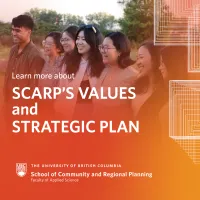SCARP's extraordinary PhD students conduct and mobilise original research with cunning new insights, and enter a broader world as planning scholars with the insights gained at UBC SCARP.
Put Knowledge in Action
For its intellectual contributions SCARP is recognised worldwide for being a bastion of progressive planning, community-engaged and participatory research, bridging theory and practice, and tackling the complex social, environmental, and technological issues facing our communities using innovative and ethical research design.
Since SCARP began offering PhD degrees in 1971, our alumni now occupy many leadership positions in academia, government, and civil society.
That’s because the questions asked at SCARP are not theoretical to us. Central to our vision of Planning is to put our knowledge in action and plan in partnership.

Curiosity, excellence, and courage in what we do
Nurturing and mentoring PhD students are key to SCARP’s identity and culture. As a PhD student at SCARP you partake in Planning PhD-specific coursework that gives you a solid intellectual foundation within the planning discipline.
Planning is, at its best, transdisciplinary. That’s why our faculty supervisors’ strongly varied expertise reinforces students’ interdisciplinary expertise.
Learn in community with peers
Our PhD program encourages inclusivity and relationship-building core to a lively intellectual environment. PhD students participate in:
- Monthly research forums, where students have opportunities to present their work, receive feedback, and refine their ideas
- Student-organized lecture series
- An annual SCARP Student Symposium, organized by students and open to the broader community around a topic of contemporary interest
- Social events for students and faculty to build camaraderie
How to apply
If you would like to apply for the next intake, please review the following steps.
Make contact and forge a connection
Applicants are strongly encouraged to reach out to prospective supervisors to determine if there is overlap in research interests and intellectual approach and to see if prospective supervisors are taking on PhD students in any given year. The Faculty Directory and each faculty members’ bio gives you some initial information on each faculty members’ research specialties, research inquiries, and lens in the world of planning.
An Expression of Interest
It is highly recommended that you submit an optional Expression of Interest to apply (which opens every year on second Thursday of September). The Expression of Interest:
- Helps match you with the best research supervisor based on your interests
- Provides an understanding of your interest in the program earlier
- Assess your fit with a Research Supervisor and the Program without having to pay the full application fee
Expressions of Interest are due every year at the end of November.
Full applications without an Expression of Interest will be accepted, but this step is highly recommended.
Those whose Expression of Interest is considered promising will be invited to submit a full application during the official application period.
You can still apply if you have not been invited to do so by a faculty member.
Apply
The option to submit your formal application will appear on this webpage once the application period begins. Please note that full applications AND referee letters are due on the same date.
After you apply
Check this webpage and email periodically. Please check your online application regularly for updates, as protocols may be subject to change. Due to the volume of documents received we are unable to confirm receipt of documents by email or phone.